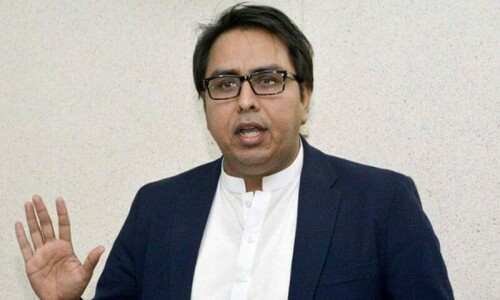LAHORE, Dec 4: The most critical diagnostic equipment CT Scan has stopped functioning at Jinnah Hospital since Nov 21 owing to a minor fault.
The CT-Scan investigation is considered the most vital to diagnose the exact location of brain-related disorder and complications.
Clinical aspect: “The incompetence of the top administration of Allama Iqbal Medical College and Jinnah Hospital can be gauged from the fact that three critical patients at the medical ICU died during the last four days due to incomplete diagnosis,” a senior doctor of the AIMC told Dawn requesting anonymity.
He said these patients died due to ‘uninvestigated diseases’ for which doctors could’t be held responsible.
“The patients were recommended CT-Scan to diagnose brain-related disorder but the treating doctors could not determine the disease and consequently the patients died for not getting accurate life-saving treatment,” the senior doctor said.
Unfortunately, he said, the incident of patients’ death also remained uninvestigated.
(The doctor had requested not to mention the names of the patients.)
He said of them one was brought with multiple-organ bleeding after a poisonous snake bit him. He was put on ventilator at Medical ICU due to his fast deteriorating health. During clinical observation, the doctors suggested CT-Scan to diagnose brain-related complications when they noticed that the health of the patient was getting out of management despite treatment. The CT-Scan could not be performed and the disease remained undisclosed till the death of the patient.
The senior doctor said at present 28 more critical patients admitted to various wards of Jinnah Hospital needed CT-Scan investigation.
Of them two were put on ventilators at the medical ICU, one at Bu Ali Sina ICU, three at main ICU, 14 at five medical departments and others at the neurosurgery unit.
He said the patients struggling for life at the medical ICU were put on ventilators following severe complications of hemorrhagic and ischemic stroke.
The treating doctors stopped recommending the test when they were informed that the CT-Scan equipment was out of order. Consequently, the risk of complications of the diseases increased manifold.
Owing to immense pressure by the relatives of the patients and the other quarters concerned, the hospital administration short-listed the patients for CT-Scan tests from other state-run teaching hospitals.
They were referring only ‘most critical’ patients to Lahore General Hospital for the CT-Scan investigation.
Even the bed-ridden patients who could not move due to the nature of disease were being referred to LGH which was 14km from Jinnah Hospital.
In routine practices, such patients are not allowed movement for even washroom-related needs due to risk to their lives.
An attendant described ‘horrifying’ ordeal when he took his patient (apparently unconsciousness) from medical ICU to LGH for CT-Scan. He said the patient was taken to LGH on Ambu bag. He said his patient collapsed three times on the way when Ambu bag dropped from his hand in the ambulance.
“The use of Ambu Bag required constant concentration and technique and an untrained attendant can’t perform this without practice,” he said.
“We received around a dozen brain stroke patients during 24 hours at Jinnah Hospital,” another senior doctor said requesting anonymity. He said of these around five critical patients were advised CT-Scan.
Administrative fault: An admin official exposed the level of negligence saying that the CT-Scan machine had not developed any fault. “The fault has actually occurred in the UPS batteries,” he said.
He said 33 UPS batteries had been installed to run this machine. The administration did not even bother to investigate as to how many batteries had developed fault or went out of order, he said.
Talking to Dawn, he also shared a matter discussed between a junior doctor of the medical ICU and AIMC Principal Prof Dr Mahmood Shaukat on the CT-Scan issue.
The official said a treating doctor himself visited the department concerned and investigated the problem related to the CT-Scan. He later called the AIMC principal and conveyed him the sufferings of the patients due to the missing facility. He sought the principal’s intervention saying that each battery’s cost ranged between Rs20,000 and Rs25,000.
The principal expressed his inability to initiate the process of purchasing the batteries on his part fearing audit objection. Mahmood Shaukat informed the doctor that the issue could be resolved through the Board of Management.
The principal told the caller (doctor) that the BoM had met recently and its next meeting was not expected in near future.
VC: Prof Mahmood Shaukat said the administration required funds to purchase UPS batteries. He said company experts visited thrice but failed to manage the fault.
He said without the BoM approval, the purchase of UPS batteries was a risky practice.
“However, I am going to take risk of audit objection in the largest interest of the patients,” he said adding that he had also decided to convince the BoM to constitute a sub-committee to resolve such issues instead of waiting action by it.
Prof Mahmood said he had written to the Health Department about the expiry of validity of CT-Scan equipment. The Chief Minister Inspection Team (CMIT) has also endorsed his viewpoint after investigating the issue at its level.
“The CMIT told me that the chief minister has also agreed to replace the old CTG-Scan by a new one,” Prof Shaukat said.
He had also asked the health authorities to streamline the system of connecting the state-run health facilities with each other for facilitating referred patients if a hospital’s equipment developed fault.
“I am also submitting some other proposals to the Health Department to avoid healthcare related problems after an equipment goes out of order,” he said adding that efforts should also be made to end monopoly of the companies providing costly equipment.













































Dear visitor, the comments section is undergoing an overhaul and will return soon.